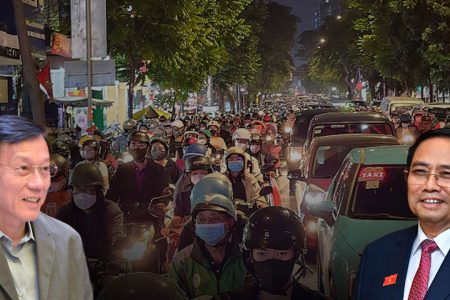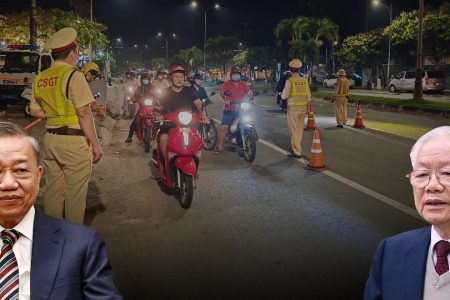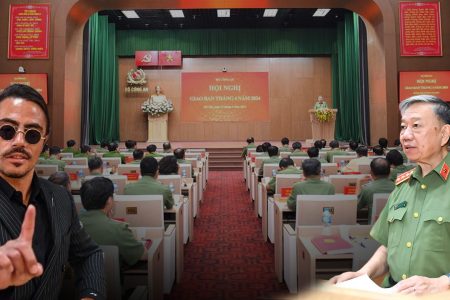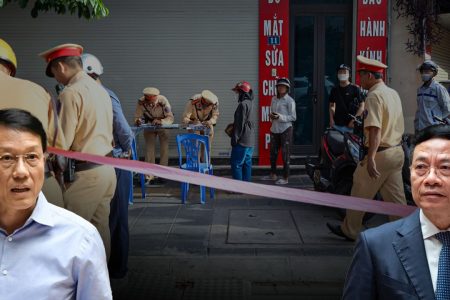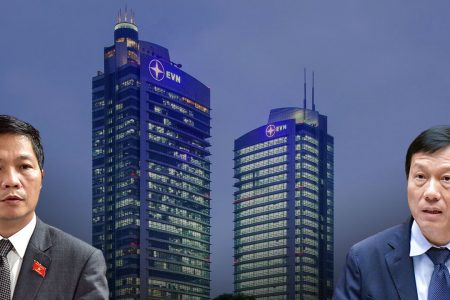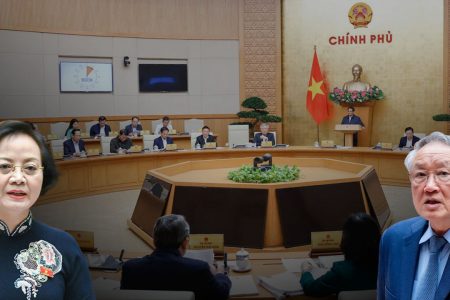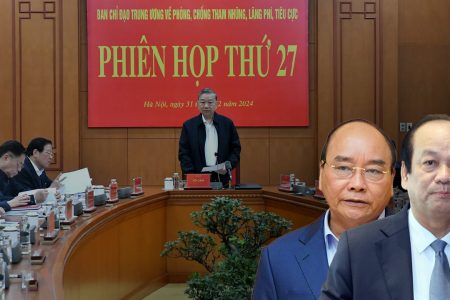Vietnam officially announced that no deaths were due to Covid-19. But the economy is suffering great losses, high unemployment due to the coronavirus pandemic.
From Florida, Dr. Pham Do Chi, a former senior expert of the International Monetary Fund (IMF), shared with BBC News Vietnamese his assessments of Vietnam’s economic prospects, and the direction he thinks in accordance with the current situation.
With the official announcement that so far no deaths due to Covid-19, Vietnam has gained a worldwide reputation for achievements in coping with the Covid-19 pandemic, but it is not easy for the Southeast Asian to solve its social economy serious crisis.

The first is that GDP growth this year is difficult to be posed like every year because of the economic uncertainties that even the Government cannot control, and the amount of GDP statistics of Vietnam which is already precarious is even more uncertain this year and 2021.
Vietnam should not focus on GDP’s target but the solution to embark on two core issues below.
The two main issues Vietnam is facing are: rising unemployment and deadlocked exports.
According to official news from the press, the number of unemployed, rotating or retiring workers in Vietnam reached 7.8 million as of the end of June.
But the real situation is even tenser. According to estimates by the Ministry of Labor, Invalids and Social Affairs, “nearly 31 million people aged 15 and over affected by the COVID-19 epidemic, lost their jobs, had to take time off work, reduced income … “The number of people with income reductions is estimated at 57%. The number of unemployed workers is concentrated in export industries, especially in processing technology, and in tourism services, or in other services such as retail trade, transportation, warehousing, and restaurants.”
Because international tourism is still very complicated and must wait at least until the end of the year for resumption, especially from the US, Vietnam has started by encouraging domestic tourism.
But the purchasing power is not enough, the image of the Ben Thanh market stalls as well as many shops in the bustling capital district of District 1, which is closed, are telling that.
The aforementioned service industries (using a large proportion of labor force) need a long time to recover.
But the more important issue is that export activity has plummeted since March, probably continuing for at least the end of the year, especially to the most important market, the US.
Recently, the Private Food Association has also raised an urgent warning about rice export, when last year’s export was 7 million tons.

New European orders of about 80,000 tons are too small! At the same time, the collapse of international oil prices also caused great difficulties for export turnover and national budget.
What to do to save the labor market according to international experience?
Based on the experience of a number of large countries in the world such as the US, Europe and especially Asia, international experts point out three main ways:
a) Direct support measures for businesses, such as tax reduction, financial supports or low-interest loans to help businesses continue to pay workers, such as the US loan program through the program “Small Business Administration” for small businesses. If difficulties arise over the long term, payday loans may be waived.
b) Direct support to households to improve emergency spending. This is an effective measure for countries with the informal sector to play an important role as in Vietnam.
Even in rich countries like the US, the Government has given each person $1,200 (and $500 per child) to spend in the first “relief” in the last 4-5 months. There may be a second round of assistance directly to households.
c) In the US, as in many Asian countries – according to Asian Development Bank, there is an important financial stimulus package from the banking sector to maintain employment.
In this way, the central bank can provide interest-free capital to commercial banks so that they can buy bonds of large enterprises or give loans without interest to small businesses.

Stronger, the US FED has large sums of money ready to buy bonds of businesses – unmatched jobs. Of course, these measures will increase the monetary volume significantly and may put pressure on inflation and exchange rates. But that is an acceptable short-term price (1-2 years) to save serious unemployment and help recover the economy faster from the epidemic.
Some practical suggestions for VN
Due to the current difficult situation of the national budget, it is difficult for Vietnam to actively apply the three official measures mentioned above.
Instead, the institutional and structural reforms should be urgently applied, emphasizing the role of the private sector, which will encourage businesses to maintain and attract more workers, and truly start the Infrastructure investment process.
1) At present, the enterprise support policy is mainly applied to the policy of postponing and extending the payment schedule such as taxes, social insurance, trade union fees, land rents, rescheduling debts, etc. work temporarily because by the end of 2020 businesses must pay these amounts. At that time, the payable debts at the same time could make the business incapable.
Therefore, there should be more exemption and reduction policies for businesses, specifically:
– Stop paying social insurance, stopping premium payment, reducing union fee by 50% because these are very large amounts payable by businesses
– Reduce 30-50% of fees and charges because businesses are subject to a lot of fees and charges
2) The 15% land rent reduction policy should apply to all businesses because most of the businesses are affected, may be operating but face a lot of fluct (currently just regulated for businesses) stop production or trade due to disease- according to Resolution 84).
3) Stability of electricity and water input prices of enterprises. Accelerating the elimination of monopoly in this field.
Regarding credit policy:
4) Banking measures:
– In the immediate future, there is a solution to support liquidity, debt restructuring, debt reschedule and debt group retention.
– Long-term need to reduce lending rates (current levels are too high)
– Expand credit guarantee measures so that small, medium, small, or micro enterprises, business households can borrow capital (these are the objects most damaged by the disease but cannot continue to get access to credit capital due to strict borrowing conditions).
5) Investing in infrastructure instead of putting resources into real estate which is a serious waste of physical resources and human resources at the moment:
Due to the difficult national budget and the lack of resources for public investment, the Government should start with the “Public-Private Partnership” program so that private enterprises can participate in grassroots programs for infrastructure development while public funding can be the “land fund.”

What is the direction out of the common crisis of countries in the world after Covid-19, especially the US? Can Vietnam rely on world economic changes, the US and the EU after the Covid-19 epidemic? BBC questions.
Dr. Pham Do Chi: This is still a serious problem because although the EU is beginning to recover from the pandemic, the economic recovery takes 12-18 months.
The US alone is more uncertain because the outbreak has been strong again for two weeks and may slow the opening of the economy, although the November presidential election may be the driving force. President Trump’s government must continue its strong economic recovery program.
Therefore, the lack of “export orders” for Vietnam and other Asian countries will probably have to continue for longer than expected.
Therefore, setting a normal GDP development target for 2020-2021 is very difficult. Need to aim more clearly at the goals of solving unemployment for these two years.
Regarding export, production of COVID-19 pandemic prevention tools should be continued for the EU and the US because this crisis will continue.

Experts talk a lot about the capital transfer and international business transfer, partly withdrawing from China to Vietnam, but is this still feasible? BBC questions.
Dr. Pham Do Chi: Vietnam has been busy preparing programs dubbed “Welcome Eagle” to host giant multi-national companies. But in reality, this will not be easy because the infrastructure is not ready and lack of supporting technology industries for big companies relocating from China.
In addition, the professional skills of the labor force are still relatively weak, the laws are still lacking in transparency, and especially the increasing corruption is causing big multinational firms to be afraid.
In general, the technology zones are quite weak, for example, the Binh Duong area has been established with a lot of investment capital which has not been fully exploited and there are many abandoned facilities. Most recent US firms have chosen to move to India and Indonesia, instead of Vietnam.
The practical ability is to try to welcome small and medium-sized firms suitable to the conditions and support capabilities of Vietnam, especially in the development of auxiliary technologies that have been mentioned for a long time and is a “bottlenecks factors” as mentioned above.
The problem of “laborers lacking skills” should also be addressed early with improving technical education and capitalist “thinking” (contributing to the firm’s development) in workers, rather than just cheap labor with the thinking “higher wages than farming is enough.”
This is a lengthy process that requires government training and support programs. The newly created Working Board to attract and direct FDI foreign direct investment is a first step to implement the necessary changes mentioned.
Thoibao.de (Translated)







